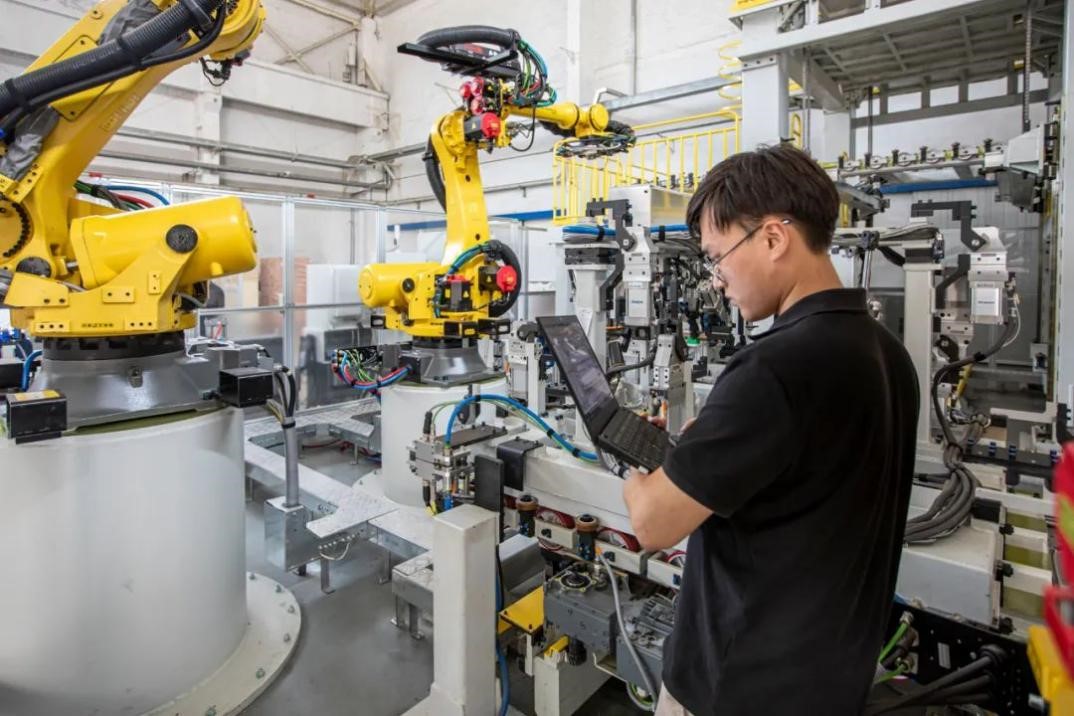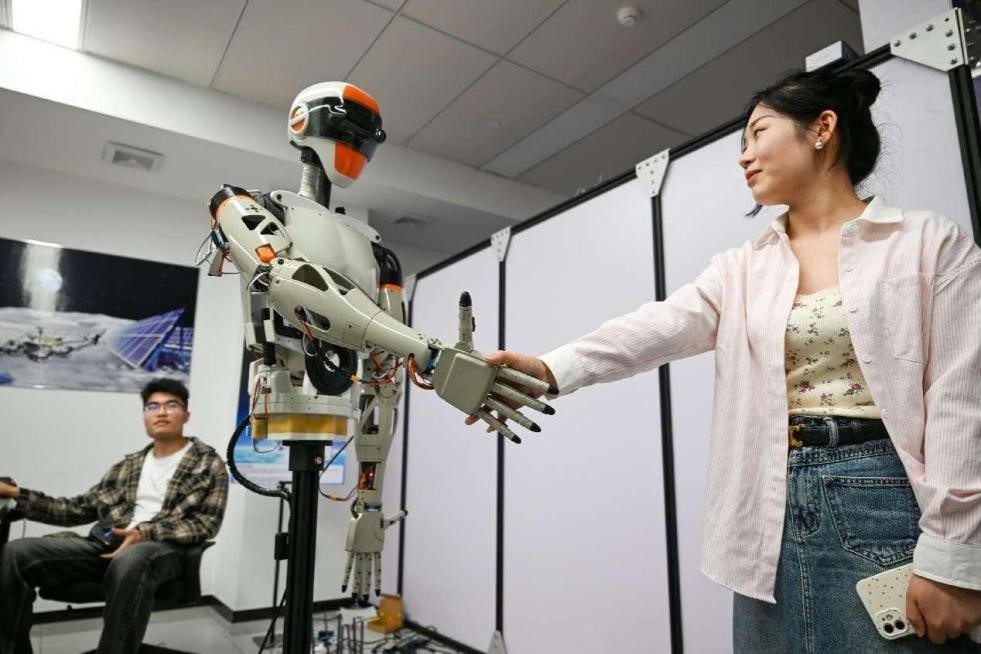AI industry sees prosperous future in China

A technician debugs devices at a 5G-Advanced (5G-A) flexible production line in a factory of China's carmaker Great Wall Motors (GWM) in Baoding, north China's Hebei province. (Photo/Luo Daqing)
The application of rubber seal strips onto a car roof was accompanied by a captivating display of a huge robotic arm picking it up and rotating it mid-air. This interesting scene was unfolded at a 5G-Advanced (5G-A) flexible production line in a factory of China's carmaker Great Wall Motors (GWM) in Baoding, north China's Hebei province.
Thanks to the integration of 5G-A and artificial intelligence (AI), this efficient production line has slashed 60 hours of downtime per year, thus avoiding potential losses of over 800 million yuan ($110.36 million) that could have been incurred by delayed deliveries.
In recent years, China has made significant strides in AI development, marked by steady growth in industrial scale, robust infrastructure, and a rapid increase of innovative achievements.
"The vast application scenarios, huge market, and massive talent pool have laid a solid foundation for the vigorous development of China's AI industry," said Yu Youcheng, deputy secretary-general of the Chinese Association for Artificial Intelligence (CAAI).
According to Yu, a large number of new breakthroughs, technologies and applications are rapidly emerging across different application scenarios in China.
Gradual improvement in infrastructure -- In 2023, the total size of China's data center racks reached 8.1 million and the scale of computing power reached 230 EFLOPS. In particular, the scale of intelligent computing power has reached 70 EFLOPS, an increase of over 70 percent.

AI-enabled robots pick tea leaves in a tea garden in Xihu district, Hangzhou, east China's Zhejiang province. (People's Daily Online/Long Wei)
Steady growth in industrial scale -- The total scale of China's core AI industry has exceeded 500 billion yuan, and the number of related enterprises has exceeded 4,500. According to a report released by CCID Consulting, a market research firm affiliated with China Center for Information Industry Development (CCID), the market scale of China's AI industry will reach 1.73 trillion yuan by 2035, accounting for 30.6 percent of the world's total.
Continuous expansion of integrated applications -- So far, large-scale AI models developed by China have shown tremendous potential in areas such as smart mining, drug research and development, meteorology, government services, finance, intelligent manufacturing, and railway management. The integrated application of the industrial internet in China has expanded to 49 major categories of the national economy, and generative AI has been widely applied in chatting robots, intelligent search, and text generation.
At the general cargo terminal of Rizhao Port in east China's Shandong province, a diverse array of general cargo items came together before making their way to different parts of the world, including steel plates made in Handan, north China's Hebei province, excavators from Zhuzhou, central China's Hunan province, and drainage pipes from Zhengzhou, the capital city of central China's Henan province.
In the past, the complex loading and unloading procedures for these items, which varied greatly in shape and size, resulted in low operational efficiency. Now, with an AI-enabled planning system, the port has boosted its overall operational efficiency by 10 percent and yard throughput by 20 percent.
Apart from assisting intelligent manufacturing, AI technology can also make typhoon forecasts, develop new drugs, identify faults, and formulate production plans. These remarkable breakthroughs are paving the way for an era of intelligence.
The application of AI technology in the transportation sector has enhanced operational efficiency and raised safety levels.

A researcher shakes hands with a humanoid robot in a laboratory of the Huzhou Institute of Zhejiang University. (People's Daily Online/Huang Yangyang)
In Changsha, the capital city of Hunan province, buses have been connected to an intelligent traffic control system managed by the traffic police. When a bus approaches an intersection, the traffic signal will automatically switch to green, allowing the bus to have priority passage.
"Smart public transportation saves commuting time by 30.7 percent on average compared to regular transportation modes," said Liu Gao, a project leader of Hunan Xiangjiang Intelligent Science and Technology Innovation Center Co., Ltd. So far, 75 routes in downtown Changsha have gone through intelligent transformation, Liu added.
AI technology has also made scientific research more efficient. Chinese software company Kingsoft has unveiled a one-stop office productivity platform powered by AI, which can analyze data as well as read and recognize Chinese characters, serving as a "well-rounded" digital employee.
While applied in experiments, AI technologies can significantly save the time needed for scientific research. For instance, Baidu AI Cloud and Shanghai Jiao Tong University have jointly developed an open-source platform for scientific data, which can accelerate the entire chain of chemical synthesis, ranging from molecular design and reaction design to condition generation and reaction testing. This platform can reduce the time required for designing potential functional molecules, such as drug molecules and their synthesis plans, from several months to just dozens of minutes.
In the face of the booming development of the AI industry, many experts and business leaders have highlighted the importance of accelerating AI-related sci-tech innovation and promoting high-quality development and high-level application of AI in order to foster new growth drivers.
Moving forward, China will continue to enhance AI infrastructure, expand AI applications, and advance key and core AI technologies to bring its AI industry onto a higher level.
Photos
Related Stories
- China's manufacturing sector revs up with AI-empowered innovation
- University in Hong Kong develops AI lecturers including Albert Einstein to revolutionize college classrooms
- Microsoft denies asking AI team to relocate from China
- China to see stable growth in ICT spending amid AI boom: IDC
- China, US engage in in-depth, professional and constructive exchanges on AI
Copyright © 2024 People's Daily Online. All Rights Reserved.









